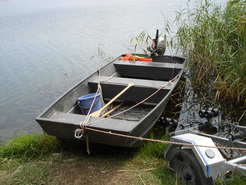Welcome!

We conduct research in Organometallic Compounds in the Environment,
paying special attention in the Biogeochemical Cycling
of Mercury in Aquatic Environments.
Mercury (Hg) is a ubiquitous and toxic element that cycles through the environment in various forms. In aquatic sediments and anoxic waters, sulphate-reducing bacteria can convert inorganic mercury into the most toxic form, methylmercury (MeHg) which bioaccumulates and biomagnifies throughout the aquatic food web from plankton to top fish predators and thus pose health risks to human. The main exposure route for MeHg to humans and wildlife is through consumption of fish and shellfish, thus pose health risks to human and causes worlwide concern. Our studies focus on the environmental processes and factors, controlling mobility, bioavailability, and thus the overall fate of mercury.
On the other hand, since oil spills in the marine environment are an issue of growing concern, we are also conducting research on Accidental Spills in Marine Ecosystems. Oil exploration and exploitation is moving from the continental shelf to deep waters, and to northern latitudes where the risk of an oil spill is potentially greater and may affect pristine ecosystems. In addition to occasional large, high profile incidents, operational oil spills are occurring on daily basis, especially along coasts in areas of intense maritime transport. The research lines undertaken in this field are mainly the chemical characterization of spilled products, the origin and determination of residues that reach the littoral through molecular tracers, and the characterization of weathering processes (i.e. evaporation, photooxidation and biodegradation).
Mercury (Hg) is a ubiquitous and toxic element that cycles through the environment in various forms. In aquatic sediments and anoxic waters, sulphate-reducing bacteria can convert inorganic mercury into the most toxic form, methylmercury (MeHg) which bioaccumulates and biomagnifies throughout the aquatic food web from plankton to top fish predators and thus pose health risks to human. The main exposure route for MeHg to humans and wildlife is through consumption of fish and shellfish, thus pose health risks to human and causes worlwide concern. Our studies focus on the environmental processes and factors, controlling mobility, bioavailability, and thus the overall fate of mercury.
On the other hand, since oil spills in the marine environment are an issue of growing concern, we are also conducting research on Accidental Spills in Marine Ecosystems. Oil exploration and exploitation is moving from the continental shelf to deep waters, and to northern latitudes where the risk of an oil spill is potentially greater and may affect pristine ecosystems. In addition to occasional large, high profile incidents, operational oil spills are occurring on daily basis, especially along coasts in areas of intense maritime transport. The research lines undertaken in this field are mainly the chemical characterization of spilled products, the origin and determination of residues that reach the littoral through molecular tracers, and the characterization of weathering processes (i.e. evaporation, photooxidation and biodegradation).
